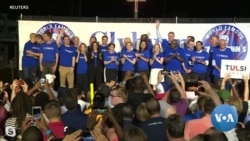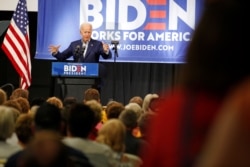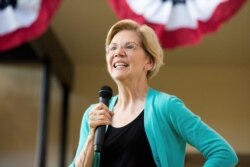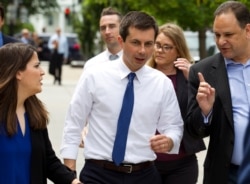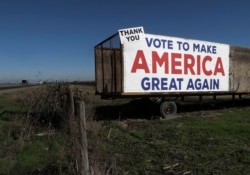The battle for the Democratic Party’s 2020 presidential nomination kicks into high gear this week with the first of what will be monthly debates among the candidates leading up to the first caucus and primary votes early next year.
Miami, Florida, will host the first debates Wednesday and Thursday. Each night will feature 10 different contenders vying for the right to take on President Donald Trump in November 2020.
Much of the attention will be on the Democratic front-runner, former Vice President Joe Biden, as he tries to solidify his position in the most crowded Democratic presidential field in modern history.
Biden continues to argue that he is the strongest candidate to take on Trump next year.
“I hope to be your nominee, and I am going to work as hard as I can to get your support,” Biden told Democrats at a candidate’s forum in South Carolina on Friday. “But here’s the deal. Whomever the Democratic nominee is, we have to stay together and elect a Democrat president of the United States of America!”
On defense
In recent days, Biden has come under attack for defending his long ago work with segregationists in the Senate, potentially opening up a new vulnerability.
Trailing Biden in the polls is Vermont Sen. Bernie Sanders and Massachusetts Sen. Elizabeth Warren, who has been surging of late.
“This is what democracy is all about. It is about being out, being with people and having a chance to talk about our vision for America. You know, it is not enough just to say, 'Not Donald Trump,'” Warren told reporters at the forum in South Carolina.
Pete Buttigieg, the previously little-known mayor of South Bend, Indiana, and California Sen. Kamala Harris round out the top tier.
Buttigieg took a break from the campaign in recent days to cope with a political uproar following a police shooting in South Bend involving a white officer and a black male victim.
A large group of other Democratic contenders continues to lag behind, and looks to the debates to help build momentum with strong performances.
New phase
These first Democratic debates mark a turning point in the campaign, according to University of Virginia analyst Kyle Kondik.
“I really think the debates have become the sort of main events almost of the primary season, particularly because you have got all these candidates across the country appearing in some of the key primary states and really all across the country. But we don’t actually have any voting to go on here until early February of next year.”
Contenders will be under pressure to make a quick impression in the few minutes of airtime they will get in the debates.
“You are going to have four or five or six candidates who find just the right soundbite, who find just the right attack on one another or on President Trump, to get in that (news) highlights reel,” said Larry Sabato, director of the Center for Politics at the University of Virginia, via Skype. “They will be the ones, potentially, to gain from the debates. The others may lose ground and may lose donors.”
Targeting Trump
Trump is likely to be the focal point of attack in the Democratic debates. During his official re-election kickoff rally last week in Orlando, Florida, he indicated he is already eager to take on the Democratic field.
“Our radical Democrat opponents are driven by hatred, prejudice and rage, and they want to destroy you and they want to destroy our country as we know it,” Trump told cheering supporters. “Not acceptable. It is not going to happen.”
Trump’s debate performances in 2016 helped to propel him to the Republican Party nomination, and many of this year’s Democratic contenders will be looking for a similar spark for their campaigns.
With 10 candidates on stage each night, the various contenders will be looking for what Emory University expert Andra Gillespie calls a “breakthrough” moment.
“We are also going to look for those who over-perform expectations or people who have that type of viral moment that gets people out there,” Gillespie told VOA via Skype. “If they are a top-tier candidate that could sustain their front-runner status, or if they are somewhere in the middle, it could actually help forge a breakthrough moment that might give them extra attention.”
Biden leads
In the latest RealClear Politics polling average, Biden remains atop the Democratic field with about 32% of the vote, followed by Sanders at 15% and Warren averaging about 12%.
Buttigieg and Harris both register about 7%, with former Texas Rep. Beto O’Rourke and New Jersey Sen. Cory Booker in the 3% to 4% range. The rest of the field is at 2% or lower.
A new poll from The Associated Press and the NORC Center for Public Affairs Research found that only 35% of Democratic voters surveyed are paying close attention to the campaign at this point. Only 22% said they know a lot about the various candidates’ policy views, suggesting that the contenders will have a chance in the debates to win over some voters.
Warren is the top contender in the first debate on Wednesday while Biden, Sanders, Buttigieg and Harris will all be on stage for the second night of debate on Thursday.
Joining Warren Wednesday will be Booker, former cabinet secretary Julian Castro, former Maryland Rep. John Delaney, New York City Mayor Bill de Blasio, Hawaii Rep. Tulsi Gabbard, Washington Gov. Jay Inslee, Minnesota Sen. Amy Klobuchar, O’Rourke and Ohio Rep. Tim Ryan.
Also among those in the Thursday debate will be Colorado Sen. Michael Bennet, New York Sen. Kirsten Gillibrand, former Colorado Gov. John Hickenlooper, California Rep. Eric Swalwell, author Marianne Williamson and entrepreneur Andrew Yang.
Three other Democrats did not qualify for the debate, including Montana Gov. Steve Bullock, Massachusetts Rep. Seth Moulton, and the mayor of Miramar, Florida, Wayne Messam.
On Sunday, the Democratic field grew to 24 candidates with the addition of former congressman and retired Navy Adm. Joe Sestak from Pennsylvania.




